Peugeot’s new Partner van launched last week is one of a trio of new vans, where much of the technology is shared between Peugeot, Citroën and now Opel brands, all of which are part of the new enlarged PSA Group.
This means that there are more choices in terms of brands, with each of these brands selecting some specification options that may be unique to them.
The more interesting van model for rural drivers is the new Peugeot Partner Grip, which comes with the Peugeot grip control system, that provides extra traction in sticky ground conditions. Peugeot is not claiming that it will replace four-wheel-drive, but it does go some of the way in providing additional traction when needed.

The dash layout on the new Peugeot Partner Grip van includes the Peugeot i-Cockpit design with a practical and durable infotainment system.
For those drivers who want a cost-effective run-about with good fuel economy and the ability to cross even the wettest of field with a one-tonne load, then this has to be a worthwhile option.
This new version of the Partner van comes with a slightly raised body and additional sump protection to prepare it for off-road use.
The additional traction is provided by the Peugeot advanced grip control system.
One clever feature of the Peugeot HADC system is the clutch mode security function
This system acts on the front wheels of the van and saves the extra weight usually associated with a more conventional four wheel drive system.
I took it across a greasy Cork stubble field in heavy rain and it was easy to maintain traction and control without the benefit of a load on board.
The system gives the driver a choice of five driving modes, accessed using a rotary dial on the centre console. The dial is similar to that used on the Land Rover range.
The system also incorporates a new Hill Assist Descent Control (HADC) to give better vehicle control on steep slopes. When descending a slope with a gradient of more than 5% and with vehicle speed below 30km/h, the system will reduce the risk of slipping. During a descent, the system maintains speed and brake control.
One clever feature of the Peugeot HADC system is the clutch mode security function. Selecting this function for very steep slopes regulates the vehicle speed to 3km/h; this allows the vehicle to creep down a steep slope in a completely controlled manner.
This new Partner Grip van has some other attractive features including a full bench seat with room for two passengers. To accommodate this, Peugeot fits an electric handbrake.
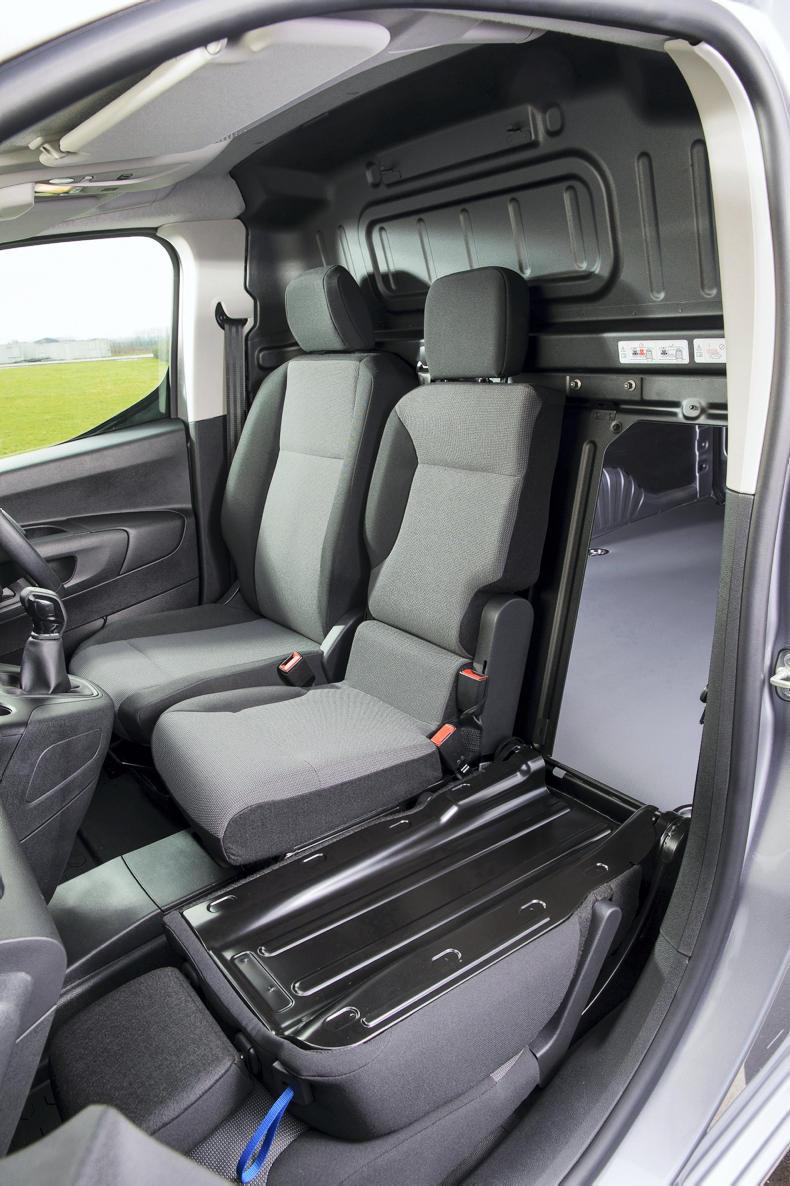
There are three seats in the new Peugeot Partner Grip van. One passenger seat is foldable to allow longer loads to be carried.
The internal area is designed for practical use, you won’t have to apologise for the condition of your boots. There is a solid looking function centre console with controls that look durable and long lasting, similar to those fitted for modern farm machines. So it was easy to set up the phone Bluetooth system and drive on.
The van comes with a sliding door, solid steel bulkhead for good noise control.
The driver’s seat has good adjustment and comes with a practical and durable fabric.
Out on the road the five-speed gearbox delivered good performance. The engine revs over the 2,000rpm mark at top motorway speeds, while on rural roads the performance ensures a more modest fuel economy level.
The rated fuel consumption figure is 23km/litre or 64mpg, which is also impressive and can be achieved with lighter loads, which for farming users is going to be mostly the case.
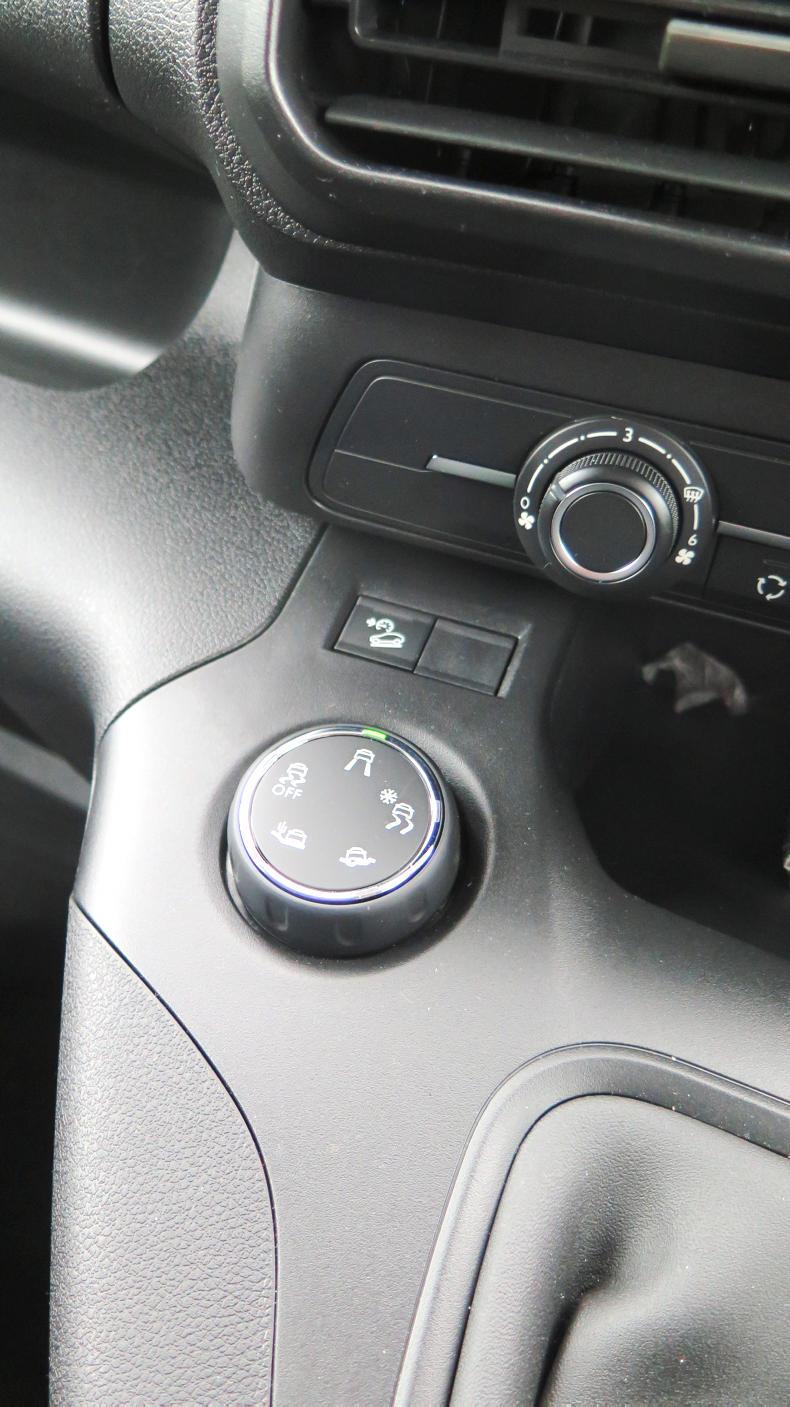
This is the simple Peugeot Grip Controller that allows for the selection of off-road driving for greasy and muddy ground conditions.
This is not a van for high-speed driving and its acceleration rate is modest at 20 seconds for a 0 to 100km/h race. That’s very acceptable, as is its towing ability at 1.5 tonnes, which is a match for Volkswagen’s Caddy van.
The overall feel to the van is one of huge improvement. There is a more solid feel to it and the comfort, vibration and noise levels have improved significantly from the past. The load area has increased and can now accommodate two Euro pallets.
The area between the wheel arches in the load area also increased, making it now a match for the Ford Transit Connect.
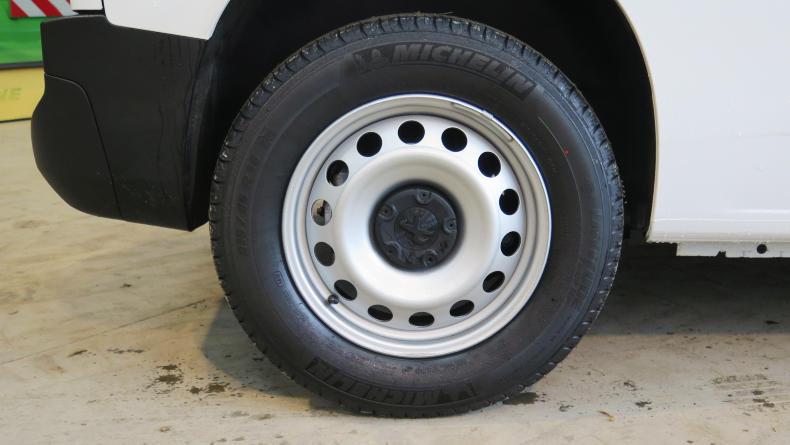
The Peugeot Partner Grip version came with Michelin Latitude 16-inch road tyres as standard, extra grip tyres will further enhance its off-road ability.
Entry prices for the Partner Grip models are competitive starting at €20,180 incl. VAT or £17,075 in Northern Ireland, which is almost €2,500 (£1,250 in NI) more expensive than the equivalent standard non-Grip model. That’s still way more cost effective options than some of the smaller commercial SUV’s on the market and more cost effective to run.
Smaller vans have a place on many farms but they need to be cost-effective to own and durable enough for farm work, while able for modest off-road conditions.
The Peugeot Partner Grip is a new option that ticks all of those boxes and more.
Peugeot’s new Partner van launched last week is one of a trio of new vans, where much of the technology is shared between Peugeot, Citroën and now Opel brands, all of which are part of the new enlarged PSA Group.
This means that there are more choices in terms of brands, with each of these brands selecting some specification options that may be unique to them.
The more interesting van model for rural drivers is the new Peugeot Partner Grip, which comes with the Peugeot grip control system, that provides extra traction in sticky ground conditions. Peugeot is not claiming that it will replace four-wheel-drive, but it does go some of the way in providing additional traction when needed.

The dash layout on the new Peugeot Partner Grip van includes the Peugeot i-Cockpit design with a practical and durable infotainment system.
For those drivers who want a cost-effective run-about with good fuel economy and the ability to cross even the wettest of field with a one-tonne load, then this has to be a worthwhile option.
This new version of the Partner van comes with a slightly raised body and additional sump protection to prepare it for off-road use.
The additional traction is provided by the Peugeot advanced grip control system.
One clever feature of the Peugeot HADC system is the clutch mode security function
This system acts on the front wheels of the van and saves the extra weight usually associated with a more conventional four wheel drive system.
I took it across a greasy Cork stubble field in heavy rain and it was easy to maintain traction and control without the benefit of a load on board.
The system gives the driver a choice of five driving modes, accessed using a rotary dial on the centre console. The dial is similar to that used on the Land Rover range.
The system also incorporates a new Hill Assist Descent Control (HADC) to give better vehicle control on steep slopes. When descending a slope with a gradient of more than 5% and with vehicle speed below 30km/h, the system will reduce the risk of slipping. During a descent, the system maintains speed and brake control.
One clever feature of the Peugeot HADC system is the clutch mode security function. Selecting this function for very steep slopes regulates the vehicle speed to 3km/h; this allows the vehicle to creep down a steep slope in a completely controlled manner.
This new Partner Grip van has some other attractive features including a full bench seat with room for two passengers. To accommodate this, Peugeot fits an electric handbrake.

There are three seats in the new Peugeot Partner Grip van. One passenger seat is foldable to allow longer loads to be carried.
The internal area is designed for practical use, you won’t have to apologise for the condition of your boots. There is a solid looking function centre console with controls that look durable and long lasting, similar to those fitted for modern farm machines. So it was easy to set up the phone Bluetooth system and drive on.
The van comes with a sliding door, solid steel bulkhead for good noise control.
The driver’s seat has good adjustment and comes with a practical and durable fabric.
Out on the road the five-speed gearbox delivered good performance. The engine revs over the 2,000rpm mark at top motorway speeds, while on rural roads the performance ensures a more modest fuel economy level.
The rated fuel consumption figure is 23km/litre or 64mpg, which is also impressive and can be achieved with lighter loads, which for farming users is going to be mostly the case.

This is the simple Peugeot Grip Controller that allows for the selection of off-road driving for greasy and muddy ground conditions.
This is not a van for high-speed driving and its acceleration rate is modest at 20 seconds for a 0 to 100km/h race. That’s very acceptable, as is its towing ability at 1.5 tonnes, which is a match for Volkswagen’s Caddy van.
The overall feel to the van is one of huge improvement. There is a more solid feel to it and the comfort, vibration and noise levels have improved significantly from the past. The load area has increased and can now accommodate two Euro pallets.
The area between the wheel arches in the load area also increased, making it now a match for the Ford Transit Connect.

The Peugeot Partner Grip version came with Michelin Latitude 16-inch road tyres as standard, extra grip tyres will further enhance its off-road ability.
Entry prices for the Partner Grip models are competitive starting at €20,180 incl. VAT or £17,075 in Northern Ireland, which is almost €2,500 (£1,250 in NI) more expensive than the equivalent standard non-Grip model. That’s still way more cost effective options than some of the smaller commercial SUV’s on the market and more cost effective to run.
Smaller vans have a place on many farms but they need to be cost-effective to own and durable enough for farm work, while able for modest off-road conditions.
The Peugeot Partner Grip is a new option that ticks all of those boxes and more.








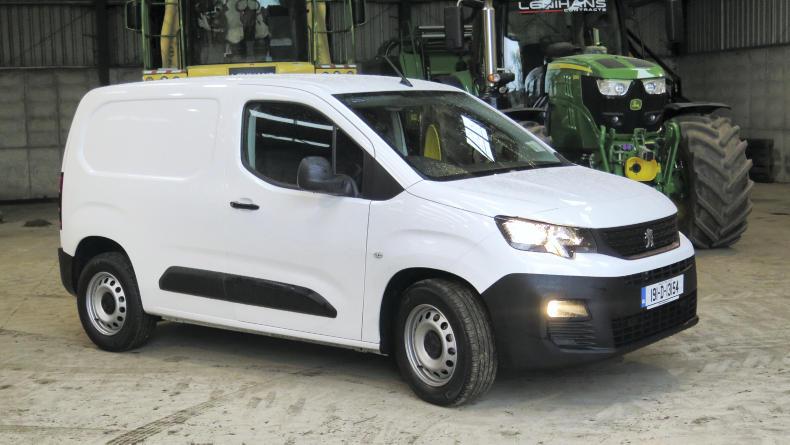
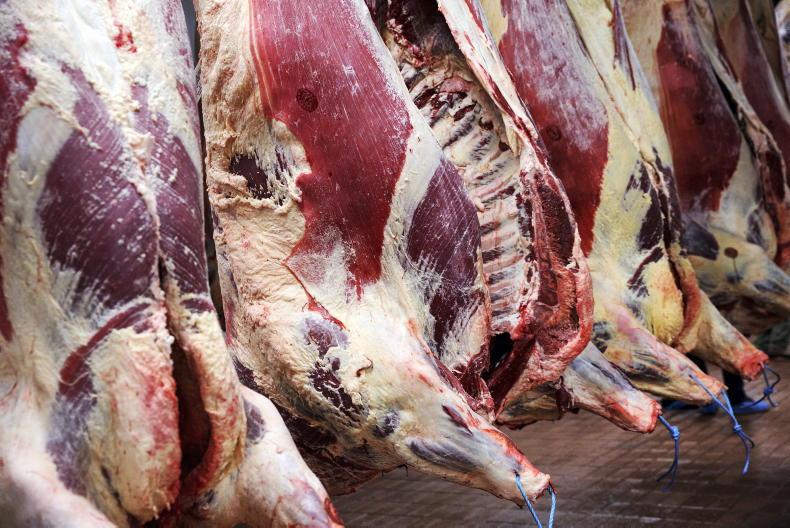

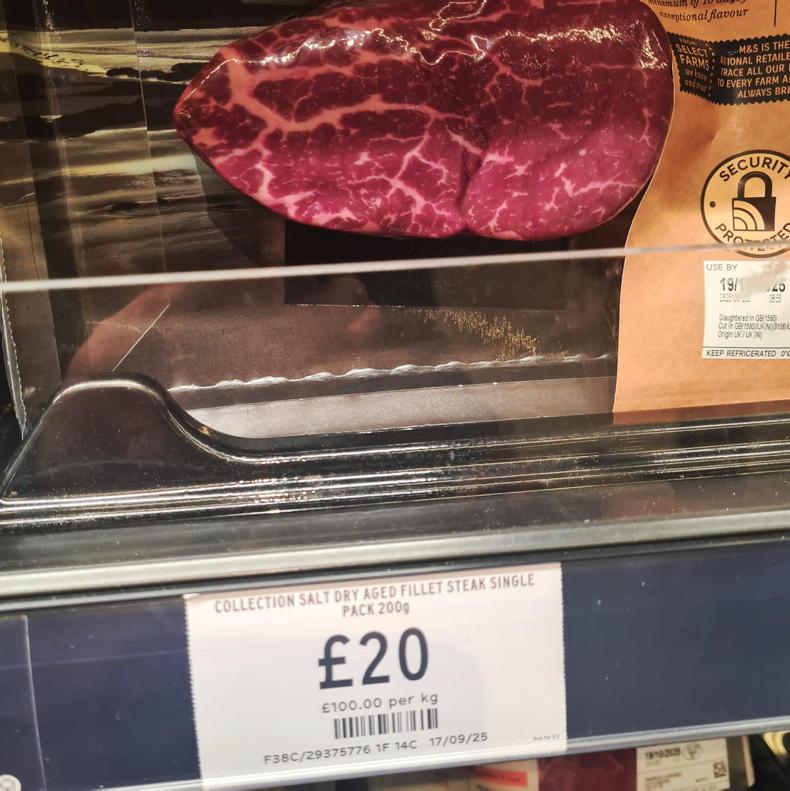
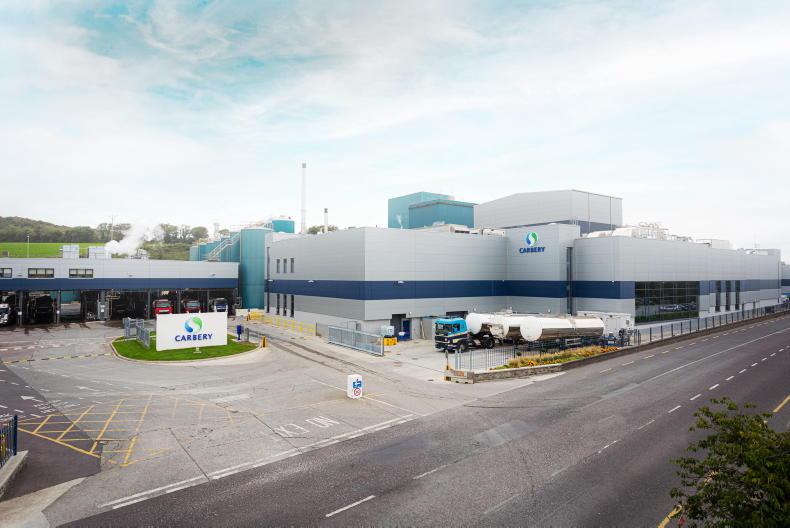
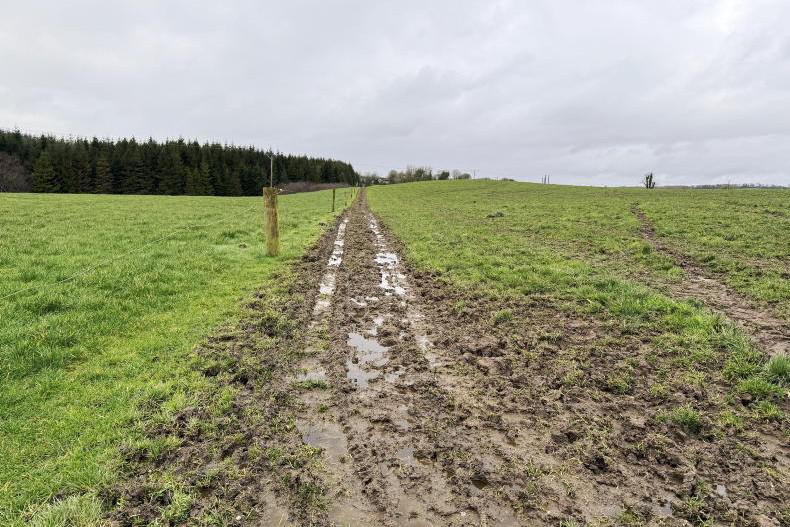
SHARING OPTIONS